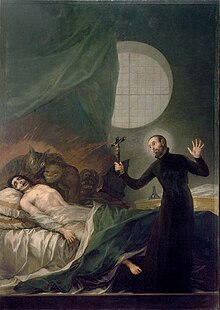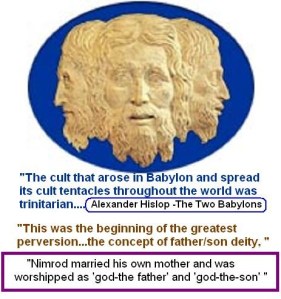False teachers and false prophets still around
When Jesus was alive he warned already for a time that false teachers would come along. Soon after he died, was risen and gone up in the skies to his heavenly Father several teachers found something interesting in the rabbi his teaching they could use for their own teachings. They mixed it with Roman Greek ideas and popular traditional thoughts.
Throughout the years deceitful individuals managed to lure people into false teachings. Worse was it when a majority of church leaders did agree with Constantine the great to come under its authority. To cease the persecution of Christians in the Roman Empire some found it better to agree to those Roman Greek teachings and several gods. By agreeing to make Jeshua into a similar figure as Zeus, making his name into Issou or ‘Hail Zeus’ the worst false teaching entered in Christendom. It was a terrible turning point for Early Christianity, By some referred to as the Triumph of the Church, the Peace of the Church or the Constantinian shift.
But already before that great turning point of the introduction of the false Trinity doctrine there where also other false teachings brought by many who tried to get people around them. We can find the apostles warning about such people who twisted the words of Jesus and mixed it with popular human philosophy and popular thoughts. Those different teachers because of the more popular ideas and giving in to pagan rites could often gain more popularity than the strict followers of Jesus Christ. Lots of people believed in demons, monsters and stories about horrible beings where much enjoyed. When there were sick people there where preachers, who tried to gain there living by so called driving out such demons, they were asked to come to help and cure. That practice of exorcising went on for a long time and never disappeared. Today we still can find exorcists all over the world.

Painting of Saint Francis Borgia performing an exorcism, by Goya
Paul said to the elders of the congregation in Ephesus:
“From among you yourselves men will rise and speak twisted things.”
And Peter wrote in a letter to several congregations:
“There will also be false teachers among you.”
This should warn us that false teachers even may come from inside the community or congregation. Already from the early times onwards there where people who did not agree with what was going on or who rebelled against the teachings made in the community. Such a rebellion against true worship and an abandoning of it was called “apostasy” and the agitators and false teachers apostates.
Today also we can see similar apostates or people trying to infiltrate the believers in One God and followers of His only begotten son, by entering Facebook Groups or other communities wanting
“to draw away the disciples after themselves.”
The disciples Paul is talking about are the disciples of the master teacher Jeshua, Jesus Christ who as a Jew believed in the Only One true God of Israel. Everywhere in the world there are people trying to get those who want to believe in that One God of Israel and in His son to become confused and to come to accept that what seems to be believed by the majority of Christians, but is therefore not the truth. These false teachers try to take, or steal, disciples from inside the congregation of real followers of Christ. Jesus said that apostates are like wolves that eat the sheep. Apostates want to destroy the faith of the members of the congregation and want them to leave the truth. (Matthew 7:15; 2 Timothy 2:18.)
Lots of men concerning the truth have erred on many aspects, and their ideas which are all false often seem more plausible or attractive, because pagan, and so many other people believe in it, like extra internal beings or spirits, good and bad angels, who are inside man and bring them to do good or bad, or so called immortal souls that leave the body after death to go into an other body or into an other space, like heaven, purgatory or a hell by which they think it is a place of torture by eternal fire.
We can see that from among our own surroundings we find people who will rise and speak twisted things to draw away the followers of Jeshua after themselves. {+ 1 Timothy 4:1; 2 Timothy 4:3, 4; 1 John 2:18, 19; Acts 20:30} We also can hear that they call themselves Christian, what should mean they should follow the Christ or Jeshua. After Christianity became poisoned by the Trinity doctrine in Christendom also came more and more different groups and/or sects,+ so that those of them who kept following the teachings of the master teacher Jeshua (Jesus Christ) who are approved may also become evident.(1 Corinthians 11:19)
The inspired utterance, the Spirit speaks expressly that in later times some shall fall away from the faith, giving heed to seducing spirits and doctrines of demons. (1 Timothy 4:1) Still today we can see that several people will drop out of the faith, giving their attention to misleading spirits and the teachings of demons. Being fooled by false teachers often in a very clever way. Several tricks are used. Apostates for example can “quietly” bring their ideas into the congregation, like criminals who secretly bring things into a country. Apostates use “counterfeit words.” This means that they say things that make their false ideas sound true, like criminals who make false documents look real. Lots of Christians often twist words of the Bible like when there is written “the son of God” they read or say “god the son”. By twisting such sayings in many passages others start believing what they are saying. Or they use such twisted wording saying “look there it says he is god the son” and here he says “I am” so he must be God. They try to get as many people as possible to believe their “deceptive teachings.” Peter also said that they like twisting the Scriptures. They explain Bible verses in the wrong way to make others believe their ideas. (2 Peter 2:1, 3, 13; 3:16) Apostates do not care about us. If we follow them, we will leave the road to everlasting life.
 Often they also try to convince you what they are telling, are things you should believe because they are to difficult for a normal human being to understand. They try to convince people around them that the Trinity is beyond human comprehension and therefore we should accepted like it is. Though it might well be that certain things in Scripture are not always so clear and can not be understood straight away, god is a God of order and clarity and did not make His Word so complicated only scholars could or would be able to understand it. However, some things in them are hard to understand, and these things the ignorant* or those people who then are unlearned and unstable, unsteadfast wrest and come to twist, the same as they do the rest of the scriptures, to their own bane, their own destruction. {2 Peter 3:16}
Often they also try to convince you what they are telling, are things you should believe because they are to difficult for a normal human being to understand. They try to convince people around them that the Trinity is beyond human comprehension and therefore we should accepted like it is. Though it might well be that certain things in Scripture are not always so clear and can not be understood straight away, god is a God of order and clarity and did not make His Word so complicated only scholars could or would be able to understand it. However, some things in them are hard to understand, and these things the ignorant* or those people who then are unlearned and unstable, unsteadfast wrest and come to twist, the same as they do the rest of the scriptures, to their own bane, their own destruction. {2 Peter 3:16}
When hearing people saying there is something written in the Bible, dare to ask them to let it see what is written and be alert yourself, daring to say when they say it is about ‘god the son” and there is written in the bible ‘the son of God’ to point out how they wrongly interpret Scriptures.
In Romans 16:17; 2 John 9-11 clear instruction is given in the Bible.
Romans 16:1: 17 Now I urge you, brothers, to keep your eye on those who create divisions and causes for stumbling contrary to the teaching that you have learned, and avoid them.+ 18 For men of that sort are slaves, not of our Lord Christ, but of their own appetites,* and by smooth talk and flattering speech they seduce the hearts of unsuspecting ones.
2 John 9-11: 9 Everyone who pushes ahead and does not remain in the teaching of the Christ does not have God.+ The one who does remain in this teaching is the one who has both the Father and the Son.+ 10 If anyone comes to you and does not bring this teaching, do not receive him into your homes+ or say a greeting to him. 11 For the one who says a greeting to him is a sharer in his wicked works.
Bombarded by lots of words wanting to have you to believe other things than are written black on white in the Bible you should be fully aware to always compare their sayings with what is written in the Bible. Always remember you must be aware that there are lots of false teachers around but that the simple warning in the bible is:
“Avoid them.”
That means that we have to stay away from them. The warning from the Bible is like a warning from a doctor who tells you to avoid a person who has a disease that may spread to others. The doctor knows that if you get this disease, you will die. His warning is clear, and you will do what he says. The Bible says that apostates are mentally diseased and that they use their teachings to make others think like them. (1 Timothy 6:3, 4) Jehovah is like that good doctor. He clearly tells us to stay away from false teachers. We must always be determined to follow his warning.
You always should know that God gave us His Word, the Holy Bible, to come to know Him and to come to understand Him and His Plan. Each person god has given the opportunity to learn about Him and to find guidance to come to Him.
When trusting God and allowing the Word of God come to you like it is written, done away from all the human doctrines, you shall be able to find the Biblical doctrines.
Instead of listening to false teachings that go against the truth in God’s Word, trust God and listen to His Word. (Psalm 31:5; John 17:17) As followers of Christ Jesus we should be careful when it comes to those who attack you and your faith. You always should know the bible itself should be your Guide. You always should have your ear to that Word of God and take the words like they are written in the Holy Scriptures. Listen to God’s Spirit Who is warning you that what certain people are teaching doesn’t sound quite right, then search the Scriptures and judge correctly. God gave you His Spirit to lead you into Truth. Don’t ignore His Spirit, but instead allow the Spirit to guide you today, tomorrow and every day of your life. Never let yourself be discouraged or weakened because you seem to stand alone in your understanding of the Scriptures.
+
Preceding articles
Nazarene Commentary Matthew 5:21-26 – 1. The Nazarene’s Commentary on Exodus 20:13
Matthew 7:12 – The Nazarene’s Commentary: Summary on the Torah’s Fulfillment
Matthew 7:15-20 – The Nazarene’s Commentary: The True Disciple #2 False prophets and fruitage
Minimizing the power of God’s Force the Holy Spirit
From Bibles and other religious writings and those who witness for Jehovah
++
Additional reading
- Listening to the lessons of the Bible and looking for ways to please God
- Inner voice inside the soul of man
- Who Gets to Say What the Bible Says?
- God’s forgotten Word 4 Lost Lawbook 3 Early digressions and Constantinic revolution
- Leading people astray!
- Solstice, Saturnalia and Christmas-stress
- Atonement And Fellowship 6/8
- Fragments from the Book of Job #5: chapters 32-37
- Displeasures and Actions of the Almighty God
- Responses to Radical Muslims and Radical Christians
- Shariah and child abuse – Is there a connection?
- Summer holiday time to knock and ask, and time to share
- Responsibility bigger than those who talk about worldly matters
+++
Further reading
- The Blood of Jesus
- Fruit FidelityI pray not to fall prey: judging good fruit from the bad
- Thessalonian Christians
- Beware of False Preachers
- 7 Marks of a False Teacher
- My experience today with detecting cults / false churches
- False Teachers List & False Prophets Exposed
- Broken Wolves Masquerading as Sheep
- Judging the wolves
- False Preachers
- True Grace, or False Grace? #1178
- The Spirit Abides In Us
- The Epistle of Jude: Contend for the Faith
- The Shepards, The Goats, The Sheep and The Wolves…
- Cookie a day: Can A Christian Believe That Jesus Is Not God And Still Be A Christian?
- Is God’s Name Blasphemed Because of You?
- Ways to Handle False Teaching
- How to Debate False Teachers
- My Thoughts On “The Hebrew Roots Movement”
- How much error does a false teacher need to exhibit before they’re considered false?
- Gary’s Blog This Month on “False Teachers”From Whom Does The Gospel Come From John Calvin Or The Holy Spirit?
- From Whom Does The Gospel Come From John Calvin Or The Holy Spirit? (Part 2)<
- When our False Evangelical Leaders Met with the Pope…Dirty SpotsBe wise to false teaching
- Christian Ghosting: The Destructive Christian Practice We Don’t Talk About By Benjamin L. Corey
- A call to feed the sheep<
- Can apostates be Christians?
- The snake, the sparrow, and the sword
- God is our author and our editor
- What will the church look like in the last days
Considering the following Hillsong video, what does it say about the state of the church in these last days, surely this video demonstrates we are witnessing the precursor to the prophesied great falling away
+++
 Exposing False Teachers
Exposing False Teachers


















 Bijbelvorsers Webs
Bijbelvorsers Webs Belgische Vrije Christadelphians / Belgian Free Christadelphians – Old Google Main Website
Belgische Vrije Christadelphians / Belgian Free Christadelphians – Old Google Main Website Christadelphian Ecclesia
Christadelphian Ecclesia Hoop tot Leven – Redding in Christus
Hoop tot Leven – Redding in Christus
Recent Comments